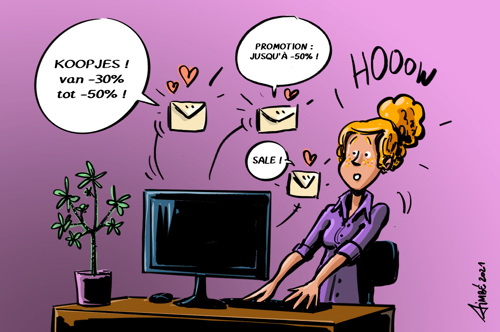- Tax Law , Commercial and Economic Law
- e-commerce , VAT rules for e-commerce , distance selling , webshop , internet sales , e-shop
By 1 July 2021, pursuant to the amended EU directive and the execution directive, new VAT rules for e-commerce will come into force. It is therefore time for all businesses with e-commerce activities to prepare for this.
Due to the corona crisis, the European Commission had postponed the entry into force of this new VAT rules from 1 January to 1 July 2021.
So there is not much time left to comply.
The aim of the new rules is twofold: (i) to simplify the levying of VAT on cross-border 'internet sales' of goods and services to consumers (B2C) and (ii) to guarantee fair competition within and outside the EU.
What exactly will change?
Several changes are made to the current system. Below we highlight the most important changes:
1. No thresholds anymore and VAT will be due in the country of destination
Today, cross-border distance selling of goods to consumers within the EU is taxable in the EU Member State where the goods are supplied.
But only ...
- if the local distance selling thresholds are exceeded and the seller is responsible for or otherwise facilitates the transport.
Some examples of such thresholds: local VAT must be applied, with respect to sales to Germany for an amount higher than EUR 35,000 per year or if to The Netherlands, sales exceed EUR 100,000 per year. - if the supplier explicitly opts for the application of VAT in the Member State of arrival.
As of 1 July 2021, this local threshold will be abolished.
As a result, VAT applicable in the EU Member State of destination of the goods will be due as from the first sale at distance.
A distance seller can still opt to apply the VAT of the Member State of his establishment, but only when the B2C intra-Community sales are below EUR 10,000.

2. Extension of MOSS or Mini-One-Stop-Shop
The MOSS or Mini-One-Stop-Shop system will be extended to all types of B2C services and goods offered online.
This system already exists for certain businesses (telecom and electronic services providers). It allows them, even if they have to charge foreign VAT, to submit VAT returns in only one EU Member State, usually the Member State of establishment or the Member State of identification (for non-EU companies).
From 1 July 2021, distance sellers will also be able to use this system.
Therefore, those distance sellers will have to register in the Member states of destination and file VAT returns in these Member States.
3. Introduction of IOSS
Distance sellers importing goods from third countries with a value of up to EUR 150 will be subject to VAT in the EU Member State of destination of the goods. The import will therefore be exempt from VAT.
The distance seller will be able to opt into this system and will then have to declare the VAT due in MOSS, more specifically in "import OSS" or I-OSS (Import-One-Stop-Shop system).
This IOSS system is not mandatory but if it is not applied, the import will be subject to VAT.
4. VAT also due on purchases of low value
In principle, all goods imported into the EU are subject to VAT. However, at this moment shipments with low value (maximum EUR 22) from outside the EU to customers within the EU, are exempt from VAT.
This exception will also be abolished.
5. What do we recommend?
We advise all businesses with a webshop or e-shop to already take the necessary measures to be ready when the new VAT rules come into force.
From then on, any on-line sale to a foreign customer (B2C) will be subject to the VAT of the foreign customer's Member State.
We do not need to explain to you the importance of complying with the VAT legislation, at the risk of severe controls and high fines.
Furthermore, do not forget that for B2C sales via a webshop, must mention the correct sales price including VAT. In other words, it is of utmost importance to mention to consumers in each EU Member state the correct prices taking into account the applicable VAT rate. To this end, your webshop must be set up such that it allows you to determine where the customer is located. This will automatically have an impact on your cookie policy.
But not to worry. This new legislation also brings a lot of good things.
The new VAT rules relating to distance selling are simplified because VAT will always be applied in the country of destination of the goods. In addition, MOSS and I-OSS systems will make it easier for web shop businesses to choose one EU Member State from which to keep the entire VAT administration.
Should you need any further information, please feel free to contact us at info@seeds.law or +32 (0) 2 747 40 07.
Read also


